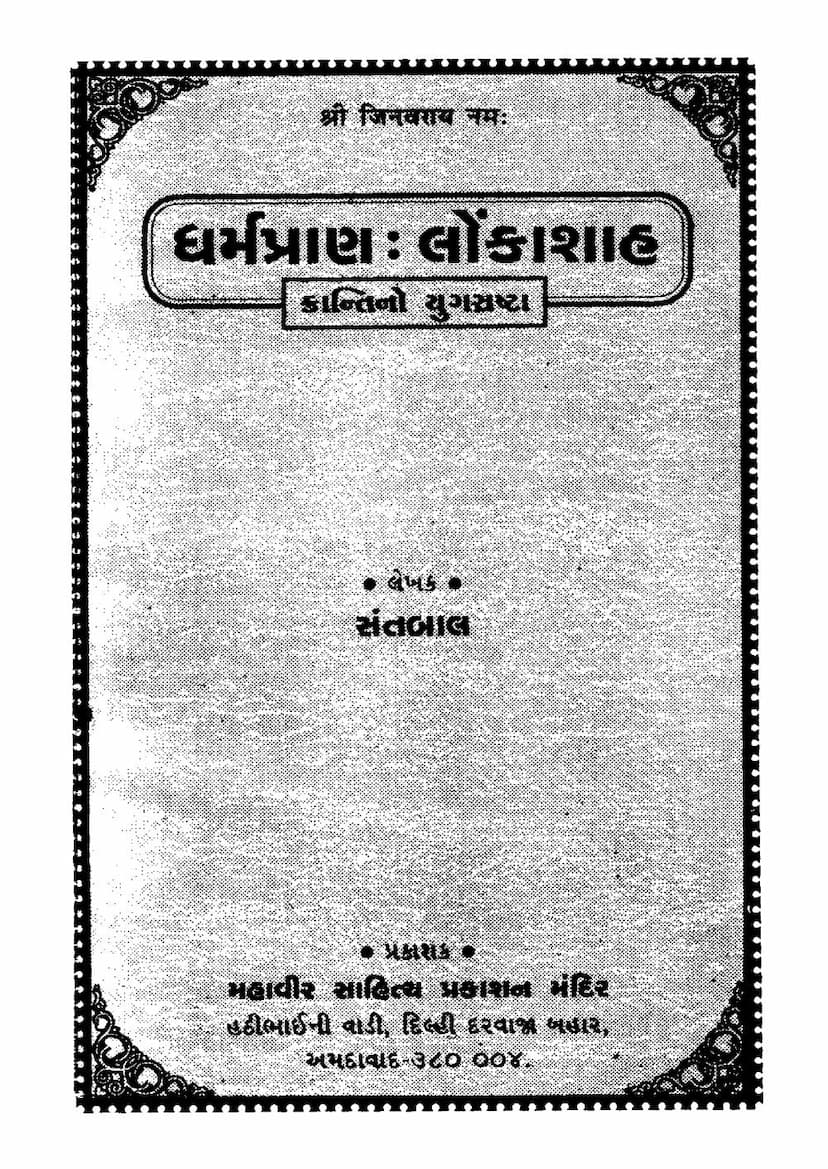Dharmpran Lonkashah
Added to library: September 1, 2025

Summary
This book, "Dharmapraan Lokshah" by Santbal, published by Mahavir Sahitya Prakashan Mandir, Ahmedabad, is a detailed exploration of the life and revolutionary impact of Lokshah on Jainism. The author, Santbal, presents Lokshah as a pivotal figure who initiated a religious reformation in the 15th century, comparable to Martin Luther in Europe.
The book highlights that Lokshah, initially a scribe, gained deep insight into religious scriptures through his work. He strongly opposed the deviations and corruptions that had crept into Jainism during his time, advocating for the core principles of the faith. The author emphasizes that Lokshah was a true "Dharmapraan" (one whose life was dedicated to religion) and a "krantikar" (revolutionary) who awakened the dormant Jain populace.
Key Themes and Content:
- Lokshah as a Reformer: The book positions Lokshah as a "Jainism's Martin Luther," who challenged established norms and rituals that had become detached from the original teachings of Lord Mahavir. He is credited with bringing about a significant transformation and reawakening in the Jain community.
- Critique of Religious Decay: Lokshah's reformist activities were a response to the prevalent issues of his time, including:
- Shraman Varg ka Shraithilya (Laxity in the Monastic Order): The book details the decline in the ethical standards and practices of monks, citing examples of indulgence, attachment to worldly possessions, and deviation from asceticism.
- Chaitya-vaad ka Vikar (Corruption of Temple-centric Worship): Lokshah challenged the excessive emphasis on idol worship and temple rituals, arguing that they had overshadowed the true spirit of Jainism, which emphasized inner purification and ethical conduct.
- Adhikar-vaad ki Shrinkhala (The Chain of Authoritarianism): He opposed the practice where certain individuals or groups within the religious order claimed exclusive rights to religious knowledge and practice, thereby hindering the spiritual progress of the laity. This created a hierarchy that limited access to scriptures and genuine spiritual guidance.
- Lokshah's Teachings and Principles: The book outlines Lokshah's core teachings:
- Emphasis on the Original Scriptures: He urged followers to return to the original teachings of Lord Mahavir as found in the scriptures.
- Rejection of Idol Worship: Lokshah strongly advocated against idol worship, considering "Maanasi Puja" (mental worship or worship of virtues) as superior and the true path. He argued that the original Jain scriptures did not endorse idol worship.
- Universalism of Jainism: He believed Jainism was a universal religion, open to all regardless of caste or background, and that different paths and philosophies could converge towards the ultimate truth (Anekantavada).
- Importance of Ahimsa, Sanyam, and Tapa: He stressed the paramount importance of non-violence, self-control, and austerity as the true essence of Jainism.
- Historical Context: The book provides a historical overview of Jainism, discussing various reform movements and influential figures from Lord Mahavir's time up to Lokshah. It also touches upon the broader religious landscape of India, including the influence of Buddhism and Vedic traditions, and how their deviations impacted Jainism.
- Lokshah's Influence and Legacy: The book details the significant impact of Lokshah's movement, which gained widespread acceptance, leading to the formation of new sects and reformist groups (like the Sthanakvasi sect). It discusses how his teachings inspired many, including later reformers like Kabir, Nanak, Dayanand Saraswati, and even some within the Muslim tradition.
- The Author's Perspective: Santbal expresses a deep reverence for Lokshah, viewing him as a visionary and a true embodiment of Jain ideals. The book also includes a "New Statement" by Santbal, reflecting on his own evolving understanding of religious reformers like Haribhadra Suri and Hemchandracharya, and acknowledging potential misinterpretations in his earlier writings. This self-reflective element underscores the author's commitment to truth and intellectual honesty.
Overall:
"Dharmapraan Lokshah" is a scholarly and devotional work that aims to reintroduce the teachings and revolutionary spirit of Lokshah to the Jain community and beyond. It serves as a testament to the enduring relevance of his reformist message in addressing contemporary challenges within religious and social spheres. The book is a valuable resource for anyone seeking to understand a significant period of Jain history and the life of a remarkable religious reformer.